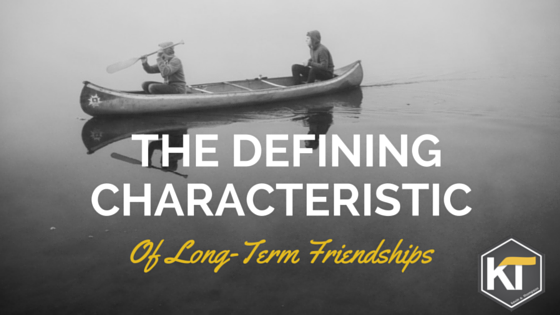I’ve got a friend who disagrees with me a lot. We’ve known each other forever. I trust him, and he trusts me. But we see the world differently–radically differently. We debate, laugh, and even mock one another. We are serious about our points, but never serious about letting the issues divide us.
Then there are others. Circumstances place us in one another’s company. We have a lot in common. We seem to be developing a good friendship. But suddenly, one disagreement forever taints the relationship. We might stay in contact. We might continue to see one another. But it is never the same. They see the world differently than I do, so we never truly become close.
Why do some friendships thrive in spite of us disagreeing and others crumble because of a single issue?
It’s been said half of our friends turn over every seven years. It’s part of life. Not every friendship is meant to last. We should embrace the fact, appreciate the times we have with people, and always be open to meeting new people. (See: Accept the Temporary Nature of Friendships)
We shouldn’t be shocked when many friendships fail to last, but why do some last and others fade?
Obviously, life setting plays an important role. We often become friends with people we do things with. We endure first grade with our classmates and some of those become lifelong friends. We draw close with parents in the stands as we watch our kids play sports. We build relationships with people we are close to in proximity. When life changes, so do friendships.
Yet, some friendships last despite geographical changes, kids choosing different paths, or a major change in life setting. Because of technology, friendship is determined less by geography than any other time in human history.
Something other than proximity defines lasting friendships.
The definitive characteristic of a long-lasting friendship is the ability to overlook another person’s faults. With some, we do and we remain friends. With others, we don’t and the friendship ends.
We are under no obligation to overlook faults. We have every right to choose whichever friendships we desire. While we do have a moral obligation to be kind to others, treat them respectfully, and assist them, we do not have to give access into our lives to whomever desires it.
Some faults shouldn’t be overlooked within the context of friendship. If someone is untrustworthy, emotionally unhealthy, or personally destructive, we should not be friends with them. Many people need to do a better job of creating boundaries within their lives and separating themselves from toxic relationships. (See: Drama Addicts)
Yet in other situations, we could have much richer relationships if we would simply give people space to be imperfect. If we would be willing to overlook their faults in the same way we overlook the faults of our friends, we could continue to be in relationship with the person.
To overlook is not just a passive act. Keeping a friendship going means we must continue to initiate contact with the other person even when we disagree, are frustrated, or feel disappointed that they aren’t exactly like us.
Rarely do we consciously end a friendship because we disagree with others. More often, we unconsciously stop making contact with the person because we feel they are different from us. We sacrifice some friendships because we are unwilling to overlook weaknesses in some people despite our ability to overlook those same faults in others.
We don’t have to agree to be friends. We don’t have to like every decision the person makes or every opinion they hold. We can be in relationship with people who are not like us. (See: How to Fix a Broken Friendship)
And the more friendships we have with people who aren’t like us, the richer our lives will be.
You don’t have to overlook anything in anyone. But if you have the ability to do so, you can have a network of friends much broader and more diverse than many people.




2 Responses to The Defining Characteristic of Long-Term Friendships